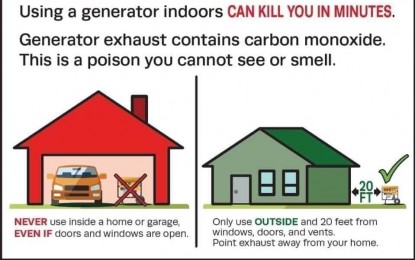
Infographic of the Department of Health-Bicol on the proper use of generator to avoid carbon monoxide poisoning.
LEGAZPI CITY – The police in Albay on Sunday said three persons were reported dead while 10 others were hospitalized in the province due to carbon monoxide (CO) poisoning associated with the use of generators.
This, as the Department of Health-Center for Health Development (DOH-CHD) in the region reminded the public of the risks of CO poisoning in the aftermath of the recent Typhoons Quinta, Rolly and Ulysses, when many people resorted to using generator sets amid power outages.
Albay provincial police spokesperson Capt. Dexter Panganiban, in an interview, said in the municipality of Tiwi, two persons died and two others were hospitalized, while in Ligao City, one person died, and eight were hospitalized. All victims were referred to the Bicol Regional Training and Teaching Hospital (BRTTH).
In an advisory, DOH-Bicol said generators, if used improperly, can lead to the buildup of CO inside homes, garages, or buildings that could poison people inside.
"Clinicians and the general public are warned to watch out for symptoms that are related to CO poisoning," DOH-Bicol assistant regional director Ferchito Avelino said.
He noted that symptoms include headache, shortness of breath, altered mental status and behavior, fatigue, malaise or a general feeling of sickness, dizziness, clumsiness or difficulty in walking, vision problems, confusion and impaired judgment, nausea and vomiting, rapid breathing, chest pain, and a rapid or irregular heartbeat.
These symptoms coupled with a history of exposure to carbon monoxide or several people with similar complaints are red flags for possible carbon monoxide poisoning, Avelino said.
The advisory added that at high risk for CO poisoning are babies, pregnant women, the elderly, and people with chronic conditions such as anemia, respiratory illness, or heart disease.
The DOH-Bicol urged the people to immediately report to authorities or bring to the hospital suspected cases of CO poisoning.
The health agency has intensified its information dissemination through various media platforms and coordinated with local health officials through the DOH Development Management Officers on the proper use of generator sets as well as with hospitals on prompt diagnosis and treatment of victims to prevent mortality from CO poisoning. (PNA)
